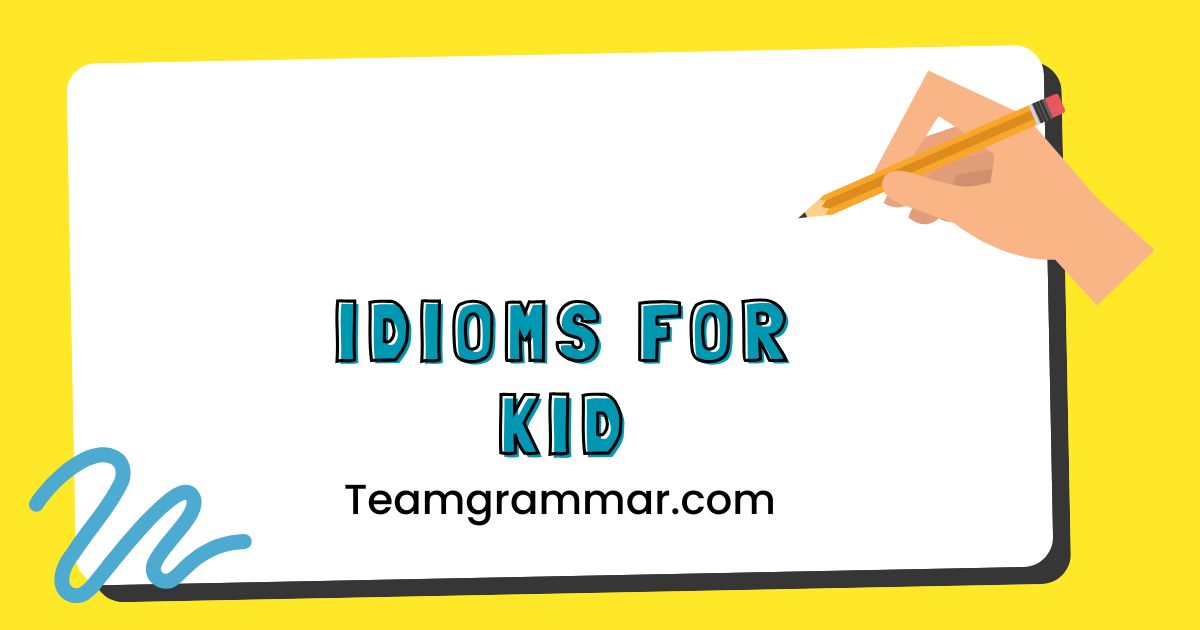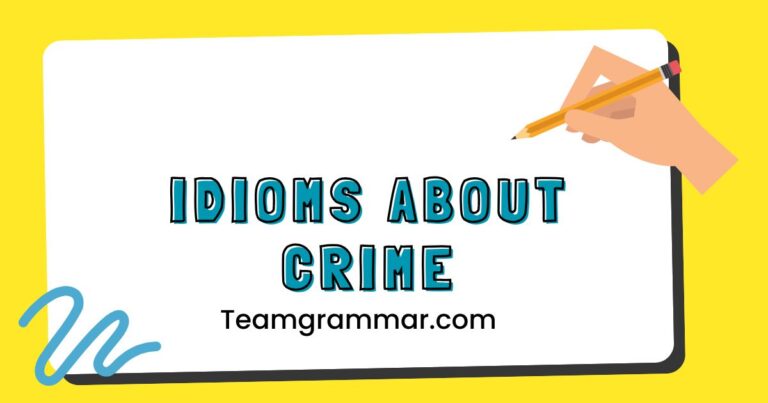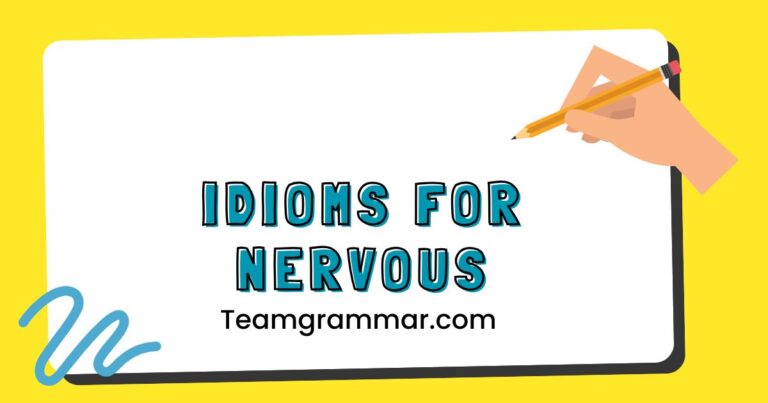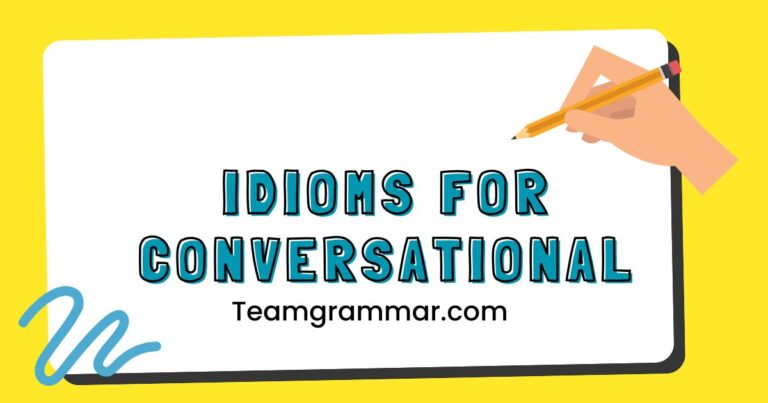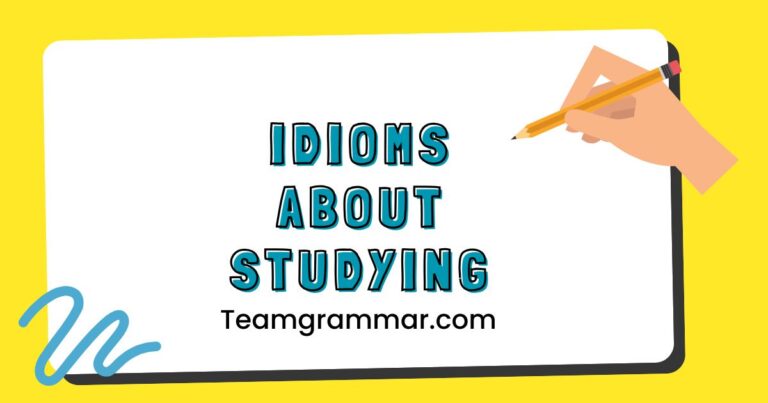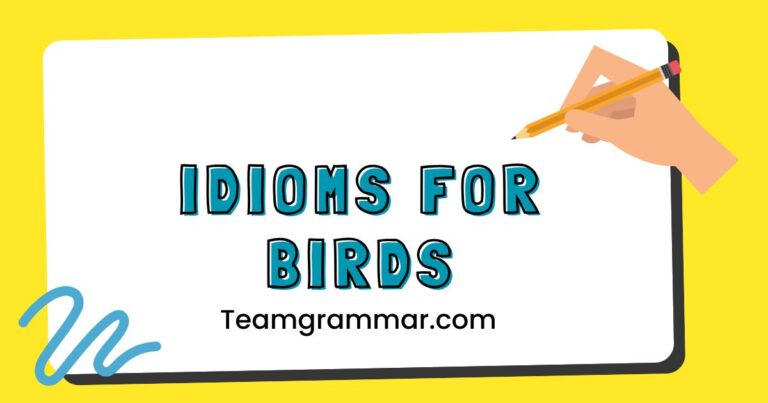39 Fun With Idioms: A Kid’s Guide to Colorful Expressions
Idioms are like secret codes in the English language! They’re phrases where the words together mean something different than what they mean on their own.
Understanding idioms makes reading and listening more fun and helps you express yourself in interesting ways. This guide will help you learn what idioms are, how they work, and how to use them to become a super speaker and reader of English.
Get ready to unlock the hidden meanings behind common phrases!
Table of Contents
- Introduction
- What Are Idioms?
- Structure of Idioms
- Types of Idioms
- Examples of Idioms
- How to Use Idioms
- Common Mistakes with Idioms
- Practice Exercises
- Advanced Idioms
- Frequently Asked Questions
- Conclusion
What Are Idioms?
An idiom is a phrase or expression where the words used have a different meaning together than they do when you look at each word separately. Think of it like this: if someone says “It’s raining cats and dogs,” they don’t actually mean animals are falling from the sky!
They mean it’s raining very hard. Idioms add color and interest to language, making it more expressive and fun.
Idioms are used in everyday conversation, in books, and even in movies. Learning idioms can help you understand what people really mean, even if their words seem a little strange at first.
They are a key part of mastering the English language and understanding its nuances.
Definition and Explanation
The formal definition of an idiom is a group of words established by usage as having a meaning not deducible from those of the individual words. In simpler terms, it’s a saying that has a special meaning that you can’t understand just by looking at the words themselves.
This special meaning comes from how people have used the phrase over time.
For example, the idiom “break a leg” means “good luck,” especially to someone who is about to perform on stage. It’s a strange thing to say if you think about it literally, but it’s a common and well-understood expression.
Classification of Idioms
Idioms can be classified in different ways. One way is by their function in a sentence.
Some idioms act like verbs, others like nouns, and still others like adjectives or adverbs. Another way to classify them is by their topic or theme.
For example, some idioms are about animals, others are about food, and still others are about feelings.
Understanding how idioms are classified can help you learn them more easily. When you know what kind of word an idiom is acting as, you can better understand how to use it in a sentence.
Similarly, when you know the theme of an idiom, you can remember its meaning more easily.
Function of Idioms
The main function of idioms is to add color and expression to language. They can make your writing and speaking more interesting and engaging.
Idioms can also help you express complex ideas in a shorter and more memorable way. Instead of saying “I’m very nervous,” you can say “I have butterflies in my stomach.”
Idioms can also be used to create humor or to soften a difficult message. For example, if someone makes a mistake, you might say “Everyone drops the ball sometimes.” This is a gentler way of saying that they made a mistake.
Contexts Where Idioms Are Used
Idioms are used in a wide variety of contexts, from everyday conversations to formal speeches. You’ll hear them on TV, in movies, in books, and in songs.
They’re a common part of the English language, and you’ll encounter them everywhere you go.
However, it’s important to be aware that some idioms are more common in certain regions or cultures than others. Also, some idioms are considered informal and might not be appropriate for formal situations.
Structure of Idioms
Idioms don’t always follow the same grammatical rules as regular phrases. Sometimes the word order is fixed, and you can’t change it.
Other times, you can change the form of the words to match the tense of the sentence.
For example, the idiom “kick the bucket” means “to die.” You can’t change the order of the words and say “bucket the kick.” However, you can change the tense of the verb to say “He kicked the bucket” or “She is going to kick the bucket.”
Fixed Expressions
Many idioms arefixed expressions, meaning that the words must always be in the same order. Changing the order of the words can make the idiom sound strange or even meaningless.
Examples of fixed expressions include “spill the beans,” “bite the bullet,” and “hit the nail on the head.”
It’s important to memorize these idioms exactly as they are. Practice using them in sentences to get a feel for how they sound.
Variable Expressions
Some idioms are more variable, meaning that you can change the form of the words to match the tense of the sentence or the subject of the verb. For example, the idiom “to be in the same boat” can be changed to “we are in the same boat,” “they were in the same boat,” or “I am in the same boat.”
When using variable idioms, pay attention to the grammar of the sentence and make sure that the idiom fits grammatically.
Grammatical Structure
Idioms can have different grammatical structures. Some are phrases, some are clauses, and some are complete sentences.
Aphraseis a group of words that doesn’t have a subject and a verb. Aclauseis a group of words that has a subject and a verb.
Asentenceis a complete thought that has a subject and a verb.
Examples of idioms that are phrases include “a piece of cake” and “once in a blue moon.” Examples of idioms that are clauses include “when pigs fly” and “it’s raining cats and dogs.” Examples of idioms that are complete sentences include “That’s the way the cookie crumbles” and “Easy come, easy go.”
Types of Idioms
Idioms can be categorized based on their structure, meaning, or the topic they relate to. Here are some common types of idioms:
Simile Idioms
These idioms use the words “like” or “as” to compare two things. For example, “as cool as a cucumber” means very calm and relaxed.
Metaphor Idioms
These idioms use a metaphor to describe something. A metaphor is a figure of speech that compares two things without using “like” or “as.” For example, “a heart of gold” means someone is very kind and generous.
Hyperbole Idioms
These idioms use exaggeration to make a point. For example, “I’m so hungry I could eat a horse” means you’re very hungry.
Personification Idioms
These idioms give human qualities to non-human things. For example, “time flies” means time passes quickly.
Cliche Idioms
These idioms are overused and have become predictable. While they are still idioms, it’s best to use them sparingly in writing and speaking.
An example is “better late than never.”
Examples of Idioms
Here are some examples of idioms, categorized by common themes, to help you understand their meanings and usage.
Animal Idioms
Animal idioms are very common in English. Here’s a table with examples:
| Idiom | Meaning | Example Sentence |
|---|---|---|
| A bird in the hand is worth two in the bush | It’s better to keep what you have than to risk losing it by trying to get more. | I know that new job pays more, but a bird in the hand is worth two in the bush, so I’m staying where I am. |
| Kill two birds with one stone | To accomplish two things at once. | By walking to school, I can kill two birds with one stone: get exercise and save money on bus fare. |
| Let the cat out of the bag | To reveal a secret. | I didn’t mean to let the cat out of the bag, but I accidentally told her about the surprise party. |
| Hold your horses | Wait a moment; be patient. | Hold your horses! We need to plan this carefully before we start. |
| Straight from the horse’s mouth | From a reliable source. | I heard it straight from the horse’s mouth that the school is getting a new playground. |
| Busy as a bee | Very busy. | She’s been as busy as a bee getting ready for the school play. |
| Eager beaver | Someone who is enthusiastic and hardworking. | He’s such an eager beaver; he always volunteers for extra tasks. |
| Cat got your tongue? | Why aren’t you talking? | You’ve been quiet all evening. Cat got your tongue? |
| Cry wolf | To raise a false alarm. | He’s cried wolf so many times that no one believes him anymore. |
| Dog days | The hottest days of the summer. | During the dog days, we like to stay inside where it’s cool. |
| Elephant in the room | An obvious problem that no one wants to discuss. | The elephant in the room is that we don’t have enough money to finish the project. |
| Fish out of water | Someone who is uncomfortable in a new situation. | Moving to a big city made him feel like a fish out of water. |
| Get off my back | Leave me alone. | Can you please get off my back? I’m trying to concentrate. |
| Guinea pig | Someone used in an experiment. | They used the new students as guinea pigs for the new teaching method. |
| Happy as a clam | Very happy. | She was as happy as a clam when she got the new bike. |
| In the doghouse | In trouble. | He’s in the doghouse with his parents for staying out late. |
| Kangaroo court | An unofficial court. | The students set up a kangaroo court to punish the bullies. |
| Lamb to the slaughter | Someone who is unaware of danger. | He went into the meeting like a lamb to the slaughter, not knowing what was about to happen. |
| Mad as a hornet | Very angry. | She was as mad as a hornet when she found out what he had done. |
| Night owl | Someone who stays up late. | He’s a night owl and prefers to work late at night. |
| Open a can of worms | To create a new set of problems | By investigating the issue, he opened a can of worms. |
| Play possum | To pretend to be dead or asleep. | The opossum played possum when the dog approached. |
| Quiet as a mouse | Very quiet. | The children were quiet as a mouse during the movie. |
| Raining cats and dogs | Raining heavily. | It’s raining cats and dogs outside! |
| Smell a rat | To suspect something is wrong. | I smell a rat; something doesn’t seem right. |
| Take the bull by the horns | To face a difficult situation directly. | It’s time to take the bull by the horns and deal with this problem. |
| Ugly duckling | Someone who is awkward but grows into something beautiful. | She was an ugly duckling in high school, but now she’s a stunning model. |
| Viper in the grass | A hidden enemy. | Be careful, he’s a viper in the grass. |
| Wild goose chase | A pointless search. | Looking for that document was a wild goose chase. |
| X marks the spot | The exact location. | According to the map, X marks the spot! |
This table illustrates how animal idioms add color to the English language, often conveying meanings that are more vivid and memorable than literal expressions.
Food Idioms
Food idioms are also very common and often relate to everyday experiences.
| Idiom | Meaning | Example Sentence |
|---|---|---|
| A piece of cake | Very easy. | The test was a piece of cake! |
| Butter someone up | To flatter someone to get them to do something. | He tried to butter her up by giving her compliments. |
| Cool as a cucumber | Very calm and relaxed. | Even under pressure, she remained as cool as a cucumber. |
| Cream of the crop | The best of the best. | These students are the cream of the crop. |
| Cup of tea | Something you like or are good at. | Gardening isn’t really my cup of tea. |
| Egg on your face | To be embarrassed. | He had egg on his face when he realized he was wrong. |
| Full of beans | Energetic and lively. | The kids were full of beans after their nap. |
| Hard nut to crack | A difficult person to deal with. | He’s a hard nut to crack, but I’m sure we can win him over. |
| In a pickle | In a difficult situation. | We’re in a pickle because we don’t have enough money to pay the bills. |
| Like two peas in a pod | Very similar. | They are like two peas in a pod; they do everything together. |
| Nuts about | Very enthusiastic or fond of. | She’s nuts about her new puppy. |
| One smart cookie | A clever person. | She’s one smart cookie; she always gets good grades. |
| Piece of pie | Very easy. | The project was a piece of pie. |
| Spill the beans | To reveal a secret. | Don’t spill the beans about the surprise party! |
| Take something with a grain of salt | To not completely believe something. | You should take his story with a grain of salt. |
| Top banana | The leader. | He’s the top banana in the company. |
| Upset the apple cart | To disrupt plans. | His sudden resignation upset the apple cart. |
| Walking on eggshells | Being very careful not to offend someone. | I feel like I’m walking on eggshells around her lately. |
| You can’t have your cake and eat it too | You can’t have everything you want. | You can’t have your cake and eat it too; you have to choose one. |
| Zero sum game | A situation where one person’s gain is another person’s loss. | Their negotiation turned into a zero sum game. |
| A bad egg | A dishonest or unpleasant person. | He’s a bad egg; I wouldn’t trust him. |
| Bread and butter | A main source of income. | Teaching is my bread and butter. |
| Cheesy | Tacky or corny. | That movie was so cheesy! |
| Don’t count your chickens before they hatch | Don’t rely on something before it happens. | Don’t count your chickens before they hatch; wait until you get the job offer. |
| Eat humble pie | To admit you were wrong. | He had to eat humble pie after his prediction was wrong. |
| Finger licking good | Delicious. | This barbecue is finger licking good! |
| Go bananas | To become very excited or crazy. | The crowd went bananas when the band came on stage. |
| Have a sweet tooth | To enjoy sugary foods. | I have a sweet tooth and love chocolate. |
| Icing on the cake | An additional benefit. | Getting a bonus was the icing on the cake. |
| Jump the gun | To start something too early. | They jumped the gun by announcing the project before it was ready. |
This table provides a rich collection of food-related idioms to enhance your understanding and usage in various contexts.
Body Idioms
Body idioms use parts of the body to describe feelings, actions, or situations.
| Idiom | Meaning | Example Sentence |
|---|---|---|
| All ears | Listening attentively. | I’m all ears; tell me what happened. |
| Break a leg | Good luck. | Break a leg with your performance tonight! |
| Cost an arm and a leg | Very expensive. | That car cost an arm and a leg. |
| Get something off your chest | To talk about something that’s been bothering you. | I need to get something off my chest. |
| Give someone a hand | To help someone. | Can you give me a hand with this box? |
| Head in the clouds | Not paying attention to reality. | He has his head in the clouds and never focuses. |
| Keep an eye on | To watch something carefully. | Can you keep an eye on my bag while I go to the restroom? |
| Laugh your head off | To laugh very hard. | We laughed our heads off at the comedy show. |
| Pull someone’s leg | To joke with someone. | I was just pulling your leg! |
| See eye to eye | To agree with someone. | We don’t always see eye to eye, but we respect each other’s opinions. |
| Turn a blind eye | To ignore something. | The teacher turned a blind eye to the students’ misbehavior. |
| Under your nose | In plain sight. | It was right under your nose the whole time! |
| Wet behind the ears | Inexperienced. | He’s still wet behind the ears, so be patient with him. |
| X marks the spot | The exact location. | According to the map, X marks the spot! |
| Yank someone’s chain | To tease someone. | He’s just yanking your chain; don’t take him seriously. |
| Zip your lip | Be quiet. | Zip your lip and listen to the instructions. |
| A gut feeling | An intuitive feeling. | I have a gut feeling that something is wrong. |
| Behind someone’s back | Without someone’s knowledge or permission. | They talked about him behind his back. |
| Catch someone’s eye | To attract someone’s attention. | The colorful painting caught my eye. |
| Face the music | To accept the consequences of your actions. | He had to face the music after lying to his parents. |
| Get cold feet | To become nervous before an important event. | He got cold feet before the wedding. |
| Have a change of heart | To change your mind. | She had a change of heart and decided to forgive him. |
| In over your head | In a situation you can’t handle. | He’s in over his head with this project. |
| Jump down someone’s throat | To react angrily to someone. | The boss jumped down his throat for being late. |
| Keep your chin up | Stay positive. | Keep your chin up; things will get better. |
| Lend an ear | To listen to someone empathetically. | I’m here to lend an ear if you need to talk. |
| Miss the boat | To miss an opportunity. | He missed the boat by not applying for the job earlier. |
| On the tip of my tongue | Almost remembered. | His name is on the tip of my tongue. |
| Put your foot down | To be firm about something. | The parents put their foot down and said no to the party. |
| Quick on your feet | Able to think and react quickly. | She’s quick on her feet and always has a solution. |
This table showcases how idioms incorporating body parts can express a wide range of emotions, actions, and situations in a concise and vivid manner.
How to Use Idioms
Using idioms correctly can make your English sound more natural and fluent. However, it’s important to use them in the right context and to understand their meanings thoroughly.
Understanding the Context
Before using an idiom, make sure you understand its meaning and the context in which it’s appropriate. Some idioms are informal and should only be used with friends and family, while others are more formal and can be used in professional settings.
Knowing Your Audience
Consider your audience when using idioms. If you’re speaking to someone who is not a native English speaker, it’s best to avoid using too many idioms, as they may not understand them.
Using Idioms Naturally
Don’t force idioms into your speech or writing. Use them naturally as they come to you.
If you’re not sure whether an idiom is appropriate, it’s better to use a more straightforward expression.
Common Mistakes with Idioms
Here are some common mistakes that people make when using idioms:
Literal Interpretation
One of the most common mistakes is taking an idiom literally. Remember that idioms have a figurative meaning, not a literal one.
For example, if someone says “It’s a piece of cake,” they don’t mean there’s actually cake involved; they mean it’s easy.
Incorrect: I brought a piece of cake, so the test will be easy.
Correct: The test was a piece of cake.
Mixing Idioms
Another common mistake is mixing two idioms together. This can create a nonsensical or confusing expression.
Incorrect: We’ll cross that bridge when the chickens hatch.
Correct: We’ll cross that bridge when we come to it. OR Don’t count your chickens before they hatch.
Incorrect Grammar
Sometimes people use the wrong grammatical form of an idiom. Make sure you use the correct tense, verb form, and word order.
Incorrect: He spilled the beans yesterday.
Correct: He spilled the beans yesterday.
Practice Exercises
Test your understanding of idioms with these practice exercises.
Exercise 1: Matching Idioms
Match the idioms in the left column with their meanings in the right column.
| Idiom | Meaning |
|---|---|
| 1. Break a leg | a. To reveal a secret |
| 2. Spill the beans | b. Very easy |
| 3. Piece of cake | c. Good luck |
| 4. Cost an arm and a leg | d. To ignore something |
| 5. Turn a blind eye | e. Very expensive |
Answers: 1-c, 2-a, 3-b, 4-e, 5-d
Exercise 2: Fill in the Blanks
Fill in the blanks with the correct idiom from the list below.
Idiom List: all ears, get something off your chest, give someone a hand, head in the clouds, keep an eye on
| Question | Answer |
|---|---|
| 1. I’m __________; tell me what happened. | all ears |
| 2. Can you __________ my bag while I go to the restroom? | keep an eye on |
| 3. I need to __________; it’s been bothering me for days. | get something off your chest |
| 4. He has his __________ and never focuses. | head in the clouds |
| 5. Can you __________ with this box? | give someone a hand |
Exercise 3: Multiple Choice
Choose the correct meaning of the idiom in each sentence.
| Question | Options | Answer |
|---|---|---|
| 1. He’s pulling your leg. | a) Helping you, b) Joking with you, c) Hurting you | b) Joking with you |
| 2. They see eye to eye. | a) Disagree, b) Agree, c) Argue | b) Agree |
| 3. She’s full of beans. | a) Sad, b) Tired, c) Energetic | c) Energetic |
| 4. It’s raining cats and dogs. | a) Sunny, b) Light rain, c) Heavy rain | c) Heavy rain |
| 5. He’s in a pickle. | a) Happy, b) Sad, c) Difficult situation | c) Difficult situation |
Advanced Idioms
For advanced learners, here are some more complex and less common idioms:
- Bury the hatchet: To make peace after a conflict.
- Call it a day: To stop working on something.
- Get your ducks in a row: To organize things effectively.
- Jump on the bandwagon: To join a popular trend.
- The ball is in your court: It’s your turn to take action.
These idioms are more nuanced and require a deeper understanding of English language and culture to use correctly. Pay attention to how native speakers use them in conversation and writing.
Frequently Asked Questions
Here are some frequently asked questions about idioms:
- What is the difference between an idiom and a proverb?
An idiom is a phrase whose meaning is different from the literal meanings of the individual words, while a proverb is a short, well-known saying that expresses a general truth or piece of advice. Idioms are more about figurative language, while proverbs are about wisdom and common sense.
- Why are idioms so difficult to learn?
Idioms are difficult to learn because their meanings are not obvious from the individual words. You have to learn the meaning of the entire phrase as a unit. Also, idioms are often culturally specific, so what makes sense in one culture might not make sense in another.
- How can I learn idioms more effectively?
The best way to learn idioms is to immerse yourself in the English language. Read books, watch movies, listen to music, and talk to native speakers. Pay attention to how idioms are used in context and try to use them yourself. Also, keep a notebook of idioms and their meanings.
- Are idioms used in formal writing?
Some idioms are appropriate for formal writing, while others are not. It depends on the specific idiom and the context of the writing. In general, it’s best to avoid using overly informal or colloquial idioms in formal writing.
- Can I create my own idioms?
While you can try to create your own idioms, it’s unlikely that they will catch on unless they are widely adopted by other speakers of the language. Idioms typically evolve over time through common usage.
- Is it important to know the origin of an idiom to understand it?
Knowing the origin of an idiom can sometimes help you understand its meaning, but it’s not always necessary. Many idioms have obscure or forgotten origins. What’s more important is to understand how the idiom is used in contemporary English.
- Are there different kinds of idioms?
Yes, there are different kinds of idioms. Some are based on metaphors, similes, or hyperboles. Others are based on historical events or cultural references. Understanding the type of idiom can sometimes help you understand its meaning.
- How do I know when to use an idiom?
Use idioms when they fit naturally into the conversation or writing and when you are confident that your audience will understand them. If you are unsure, it’s better to use a more straightforward expression.
- What should I do if I don’t understand an idiom?
If you don’t understand an idiom, ask someone to explain it to you. You can also look it up in a dictionary or online. Pay attention to the context in which the idiom is used to help you understand its meaning.
- Are idioms used in all English-speaking countries?
While many idioms are common across English-speaking countries, some idioms are specific to certain regions or cultures. For example, some idioms are more
- Are idioms used in all English-speaking countries?
While many idioms are common across English-speaking countries, some idioms are specific to certain regions or cultures. For example, some idioms are more common in the United States than in the United Kingdom, and vice versa. Be aware of these regional differences when using idioms.
Conclusion
Congratulations! You’ve taken a fun-filled journey into the world of idioms.
By understanding what idioms are, how they’re structured, and how to use them correctly, you can add color and expression to your English. Keep practicing, and soon you’ll be speaking like a native!

